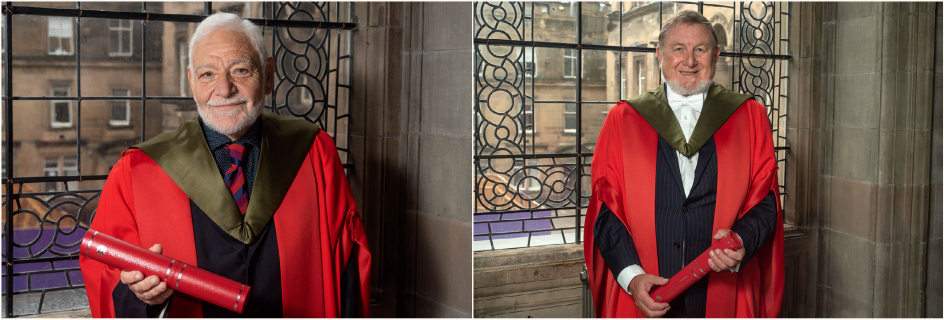Post date:
Leading lights from the international engineering community received honorary degrees from the University of Edinburgh at a ceremony on Tuesday 4 July.
Professor Sergios Theodoridis and Professor Richard Parker both received the honour during a ceremony at the McEwan Hall, in recognition of their exceptional contributions to the University of Edinburgh over a number of years.
Professor Sergios Theodoridis
Professor Theodoridis has enjoyed a long and successful career with significant research contributions to signal processing and machine learning. He has developed new theories of these techniques, with applications across audio, optical character recognition and medical applications among others.
He also wrote one of the most widely recognised textbooks on pattern recognition – a core function of modern neural networks that power the transformative artificial intelligence techniques that are now a major part of our everyday lives.
Professor Theodoridis received his PhD in 1978 from the University of Birmingham, where he worked as a postdoctoral researcher before returning to academic positions at Patras, Greece and later the University of Athens. Currently he is a Distinguished Professor at Aalborg University, Denmark.
Professor Theodoridis is a Life Fellow of the Institute of Electrical and Electronics Engineers (IEEE), and received both the IEEE Signal Processing Society Education Award for “sustained contributions to education in the area of machine learning for signal processing” and the IEEE Signal Processing Society Norbert Wiener Award – the Society's highest honour.
Professor Theodoridis is a corresponding Fellow of the Royal Society of Edinburgh (RSE) and has close ties with the City and University of Edinburgh, and our School. He has collaborated with the School’s Director of Research, Professor Michael Davies on the European Training Network on Machine Sensing (MacSeNet) and worked closely with former head of school, Professor Peter Grant, in the European Association for Signal Processing (EURASIP).
"It was almost 50 years ago that I got excited in trying to understand how to build computers that can learn from data and experience. Over these years, this branch of artificial intelligence (AI) has matured and has offered to humanity many fascinating advances that improved our lives. However, the field has grown so fast and its evolution was left unregulated to follow an “arms-race” model among companies. AI technology can now pose serious risks to our democracy. It has the power to control and manipulate us, both as citizens as well as consumers. The time has come to demand and work for transparent, fair and ethical AI. The goal of any technology is to serve humanity and not the other way around."
– Professor Sergios Theodoridis.
Professor Richard Parker
Professor Richard (Ric) Parker graduated with a degree in physics from Imperial College London in 1975. He then started a PhD in novel recording materials for 3D-imaged holograms. He recounts that he has "only applied for one job in his life”, and in October 1978 joined the Advanced Research Laboratory at Rolls-Royce, Derby, working on the application of lasers to measurement in harsh environments. He was to spend the next 37 years with Rolls-Royce in a variety of engineering roles.
Professor Parker’s roles included Chief of Composites and Ceramics where he developed aircraft engine components in these novel materials; Engineering Director, Compressor Systems, leading over 400 design and manufacturing engineers; Managing Director, Compressor Systems (his only non-engineering job) with six factories and 2,200 people under his direction. In 2000, he was appointed Director of Research and Technology for the Rolls-Royce Group, where he managed a budget of over £300m and oversaw a global network of 31 university technology centres.
In 2013, he received a CBE from Queen Elizabeth II for services to engineering, and is also a Fellow of the Royal Academy of Engineering (FREng).
Ric “retired” in 2016 and since then has advised several companies including BP, Northrop Grumman and Boom Supersonic. He is a Distinguished Visitor at the NPL. He also works for A*Star, the Singapore National Research Centre.
“To be recognised by the University of Edinburgh in this means a great deal to me. I have been associated with the University since the mid-1980s, and have worked with many wonderful people during that time. For the past 20 years, I have been a member and then Chairman of the Mechanical Engineering Advisory Board. More recently I have joined the School of Engineering’s Engineering Development Advisory Committee. To be recognised by my peers in Edinburgh with this award is truly a great honour.”
– Professor Richard Parker



